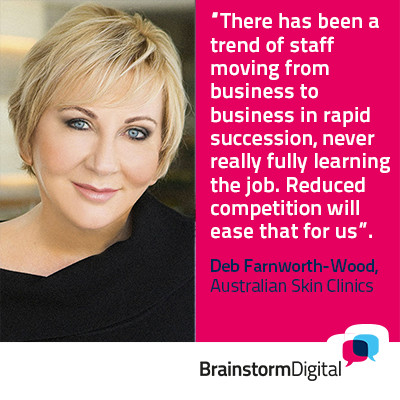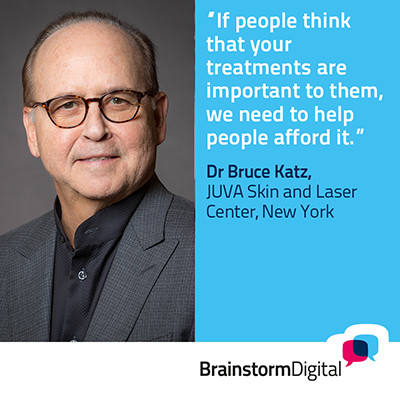
Getting your aesthetic clinic through the Coronavirus shut-down felt like fighting a tsunami.
Within days, you had to figure out how to keep your practice viable, even when you couldn’t treat patients…
And you had to keep your patients, your staff and your bank manager happy under the most difficult circumstances.
It was completely overwhelming.
Now you have come through the other side, and finally re-opened your practice doors…
But nothing is back to normal.
The economic outlook is unpredictable – as is patients’ behavior… The environment in which you operate is shifting every day.
So what is the outlook for aesthetic clinics and medspas in the next 12 months?
What deep, structural changes can you expect in the industry, which might impact the way you operate your practice – and affect your clinic’s very chances of survival?
We asked 23 top owners of aesthetic clinics and medspas from 3 continents what they expect the aesthetic industry to look like in 2021, and how they’re planning to adjust.
Here’s what they said…..
1. You’ll be able to hire better staff
During the global financial crisis of 2008, a large number of clinics went bankrupt and had to close.
This leads to greater availability of high-caliber staff, says Deb Farnworth-Wood, who grew the Australian Skin Clinics franchise to over 60 locations before selling, and now operates the Ultimate Skin & Body Clinic.
She’s already seeing the same trend occurring today.
“Over recent years there has been a trend of staff moving from business to business in rapid succession, never really fully learning the job or honing their skills. The shortage of staff nationally has meant it has been easy for them to find jobs, often without references because clinics have been desperate. In the end it’s the client that suffers because when staff move around frequently, they neither establish themselves deeply with clients or became really proficient at delivering treatments”
“Reduced competition will ease that for us.”
 Similarly, Dr Joseph Hkeik, owner of the All Saints chain of clinics in Sydney, says that he expects the work ethic of therapists and clinicians to become much better.
Similarly, Dr Joseph Hkeik, owner of the All Saints chain of clinics in Sydney, says that he expects the work ethic of therapists and clinicians to become much better.
“In our industry, we deal with lots of people who move on very easily,” he says. “People will become more reliable and more productive. The younger generation has never lived through anything like this.
“We’re going to see more of an old-fashioned approach of people being grateful for having a job.”
2. Your pricing model may change
As the economy suffers, some of your patients may have a lot less money to spend on aesthetic treatments.
Dr Bruce Katz, Medical Director of New York’s JUVA Skin and Laser Center – the world’s original medi spa – says that it’s going to become more important to offer patients financing schemes.
“We have CareCredit, so patients can pay for a procedure and have a year to pay for it, without interest,” he says. “If people think that your treatments are important to them, we need to help people afford it.”
Marsha Starcevic, co-owner of Aesthetics Lab in London’s trendy Primrose Hill, says she expects patients will be less willing to pay upfront for long courses of treatments.
“There will be a move towards a pay-as-you-go model,” she predicts. “Some people will still want to save by paying upfront but others will be cautious about this. Unfortunately, this might be a cashflow issue for clinics.”
 Meanwhile, in Co Mayo, Ireland, Stephanie Coyne, owner of Aesthetic Face Clinic, says that clinics will stop putting up with patients who cancel last-minute.
Meanwhile, in Co Mayo, Ireland, Stephanie Coyne, owner of Aesthetic Face Clinic, says that clinics will stop putting up with patients who cancel last-minute.
Right now, when a patient doesn’t show up, it can be the difference between profit and loss.
“Not only can we fit in less patients than before but we need extra time to allow for cleaning and social distancing, so if they miss their appointment, it costs us even more money.”
She has no intention of charging more, but, she says, “We’re going to have to start taking deposits. Why do treatments first and get payment later? We’re going to flip it, taking 50% upfront and anyone who misses their appointment will have to pay 100%.”
Her clinic started implementing a stricter cancellation policy last November, and told patients that when they re-open, there will be further changes to the booking system.
“People understand,” she says. “And it’s important our time is seen as more valuable.”
3. The conference circle will go virtual
Travel is going to be much more difficult for the foreseeable future. And that is just one of the reasons why the aesthetic circuit is going to move largely online, says Haley Wood, owner of The Look Facial Aesthetic in Tennessee.
“These meetings are so expensive, and clinic owners are not going to have as much time as they used to either. I would imagine that conferences will move onto web-based learning.
“In today’s economy, if you have an extra $5-$7K to spend, you won’t want to put that into a 3-4 day conference.”
Dr Anna Hemming, owner of Thames Skin Clinic in South-West London, says she was already involved in a successful virtual conference last year and that her Inbox is full of invitation to training webinars.
She believes this is the way forward, although she worries that this may not fully compare to live meetings.
“For people who need to be trained, this is a negative. They won’t get the same feel or 3D experience.”
4. You’ll have more bargaining power with your suppliers
Just like you are going to become more sensitive to your patients’ financial situation, your own vendors are going to have to become more sensitive to your finances.
“We were in the midst of purchasing a laser when Coronavirus hit,” says Mina Grasso, founder of Allure Image Enhancement in California. “Vendors know everyone’s going through tough times, so I expect vendors to make things more affordable – our purchase power will get a little stronger.”
“Suppliers have to support their existing client base,” agrees Chantal Ward, co-owner of Clarity MedSpa and Laser Centre in Toronto, Canada.
She expects clinics to be able to negotiate different pricing with their suppliers, as well as different delivery mechanisms.
 “Most injectable companies want money upfront, and will throw in various incentives – buy 50 syringes and get 50 syringes free. But if there’s another shut-down and those 50 expire, I’ve just paid list price…
“Most injectable companies want money upfront, and will throw in various incentives – buy 50 syringes and get 50 syringes free. But if there’s another shut-down and those 50 expire, I’ve just paid list price…
“Clinic owners are going to start going back to their suppliers and negotiating new terms.
“For example, they might not want to take the full supply at once, or they might ask for a guarantee in writing that if there’s another pandemic, shipment and payment stops. You’ll want to pay for what you use…”
She predicts that there will be very few devices sold until 2021. And Dr Dev Patel adds that some manufacturers may have to start pivoting just to stay in business.
“I’m usually trigger-happy investing in new tech, but I’m going to become a lot more cautious – like many others.
“That means that many suppliers and even manufacturers will be impacted and may have to divert their attention to other avenues, just like car manufacturers in Italy started making ventilators…
“One of my suppliers offered me plasma air purifiers so they’re already thinking about how they’ve going to stay in business if they’re not selling enough machines.”
5. Staff will have to do more (for less)
“Given that many practices are going to be operating with a slimmed-down team, job roles are going to have to change in many clinics.
“It’s going to become important for everyone to be able to do everyone else’s job,” says Haley Wood. “My nurse practitioner will have to schedule patients in and out and be really hands-on. If she’s not injecting or assisting, she’ll have to work phones. Staff will be tighter so everyone will have to do more.”
“We’re asking people to do more for less,” agrees Alexis de Smidt, owner of The Coliseum MediSpa in Western Vancouver.
“Before, an aesthetician was an aesthetician. Now we no longer have a concierge up front – staff have to do admin duties and process order forms that were previously done by admin staff. They have to broaden their skillset and be more flexible (as do the doctors).”
Her team has been very willing, she says, because everyone is aware that the economy is precarious and that jobs are precious right now.
“We’ve had to come together as a team to ensure the longevity of the business that sustains everyone.”
6. Patient demand will bounce back
Many clinic owners enjoyed an initial surge in bookings immediately after re-opening. But will demand stay high into next year?
Dr Stephen Mulholland, owner of SpaMedica in Toronto, and one of Canada’s best-known and most sought-after plastic surgeons, says that any drop in patient demand is likely to be temporary.
“A lot of physicians are saying that demand will change forever, and that people will stay away from excisional procedures in future,” he says. “I’ve been through 9/11 and SARS and can see that people always go back to beauty! Everything will go back to the way it was before – it’s human nature.”
On the contrary, he expects an overall growth in demand, particularly for minimally invasive procedures, and procedures with quick results or a week or less of downtime.
“There is actually a huge upswing of opportunity because people are confined to work from home. They can wear a mask and get nose job! I don’t think this will change people’s procedural decisions.”
 Dr Lisa Kellett, owner of DLK on Avenue – also in Toronto – agrees that “very little will change long-term… People will still want to rejuvenate their skin and their looks.”
Dr Lisa Kellett, owner of DLK on Avenue – also in Toronto – agrees that “very little will change long-term… People will still want to rejuvenate their skin and their looks.”
She cites the “lipstick effect”, the theory that even during a downturn, people will find ways to spend on luxuries.
“When things are out of control, people always want to do something to make them feel better. Depending on what kinds of patients you have, people will always find a way to do what they want to do… At least my patients will!”
To continue reading this article and discover 7 other major changes to the aesthetic market in 2021, go to: http://bit.ly/aesthetics2021
Miriam Shaviv is creator of Inbox Express, the library of marketing emails for aesthetic clinics and med spas, designed to make your marketing effective and easy – and send the right messages to your patients as you re-open after Coronavirus! Find out more here.
She is Director of Content at Brainstorm Digital, which helps aesthetic clinics and med spas get patients through their doors again and again – without the headache of costly online advertising.







2 Comments. Leave new
We should effective marketing ads solution. But in this period never gain. I hope patients more be happy
I am looking for aesthetic business marketing.